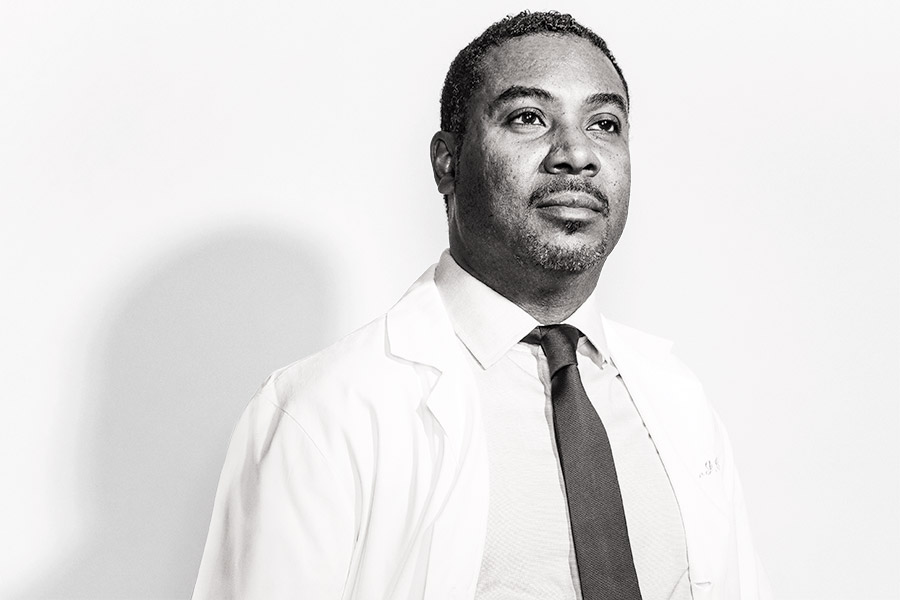Today I Told A Woman She’s Going to Die
Can we talk about learning on the job?

Damien Croft. Photograph by Colin Lenton
I told my patient today that I think she’s going to die. Not because she has any one terminal illness, but because she’s the prototype for maternal mortality in the United States: black and poor (indeed, homeless), with at least five unattended-to medical problems.
I rarely tell patients these things, and I felt bad about it afterward. Was it true? Yes, the data says so. But will telling her change anything? I’m not sure. Maybe I was hoping the shock of this blunt assessment from her doctor would spur her into action. This patient chronically misses appointments, doesn’t follow recommendations for care, and leaves the hospital against medical advice.
I know her inaction can be traced back to her economic situation: lack of stable employment, housing and safety — what a public health professional would call the “social determinants of health.” These are social factors that are known to be tied to health outcomes. I personally find it hard to make doctor visits even with all the financial and social supports I have. Maybe this was simply an opportunity to vent my fears to her — because her life is still, in many ways, in the hands of me and my colleagues, and by doing this, I’m able to push some of the responsibility back onto her. Now, I feel terrible.
Feelings of guilt and anxiety aren’t uncommon among physicians. I practice what’s called maternal-fetal medicine, or perinatology, which means I take care of pregnant women — most of whom have medical problems complicating pregnancy. In addition, I perform fetal ultrasounds to assess fetal health. While I worry a lot about developing babies, what truly terrifies me is maternal death. Recently, there have been many media stories about this topic, which only adds to the anxiety for me and those I work with.
In moments of honesty with myself, I can acknowledge that dealing with some of these patients is mentally and, at times, emotionally exhausting. The medicine is often straightforward, but the logistics are daunting: What can I expect this patient to realistically be able to accomplish?
Then I think: I should be equipped to handle this. Four years of general ob/gyn residency and an additional three years of subspecialty training, and on top of that, a master’s degree in public health — why do I still feel ill-prepared? Moreover, I’m not from some idyllic suburb. I grew up black, the child of a single mother in Spanish Harlem at the height of the crack epidemic of the 1980s. Now I’ve started to wonder: Have my training, my time away from home and, frankly, a decent salary put me out of touch with my patients’ struggles?
My patients have never said as much — directly. But at times I can see it in their eyes as soon as I walk in the room. I am “the Other.” To them, I might as well be another old white guy.
When I graduated from medical school, I had dreams about practicing medicine in a community similar to the one where I grew up. A black man from the inner city and a single-parent family, I would be able to connect with my patients in a way those from more privileged backgrounds couldn’t. But the “fantasy” of saving my patients from their difficult circumstances is far from the reality. Real people are complicated. There isn’t always a happy ending.
So I have to be honest with myself. The path to becoming a physician and the current privilege it affords me have taken me away from the places and people I grew up with. I am nowhere near the person I was 20 years ago, when I left home.
My patients and the person I am now share few similarities. I may never be able to relate to them on the level I once imagined I would, and perhaps I won’t be their savior. But my background still grants me one important gift: empathy. For my patients, perhaps that’s the greatest medicine I have to offer.
Damien Croft is an assistant professor in the Department of Obstetrics and Gynecology at Drexel University College of Medicine, where he specializes in maternal-fetal medicine.
» See Also: Top Doctors 2018: The Stories They Tell
Published as “The Stories They Tell … ” in the May 2018 issue of Philadelphia magazine.


